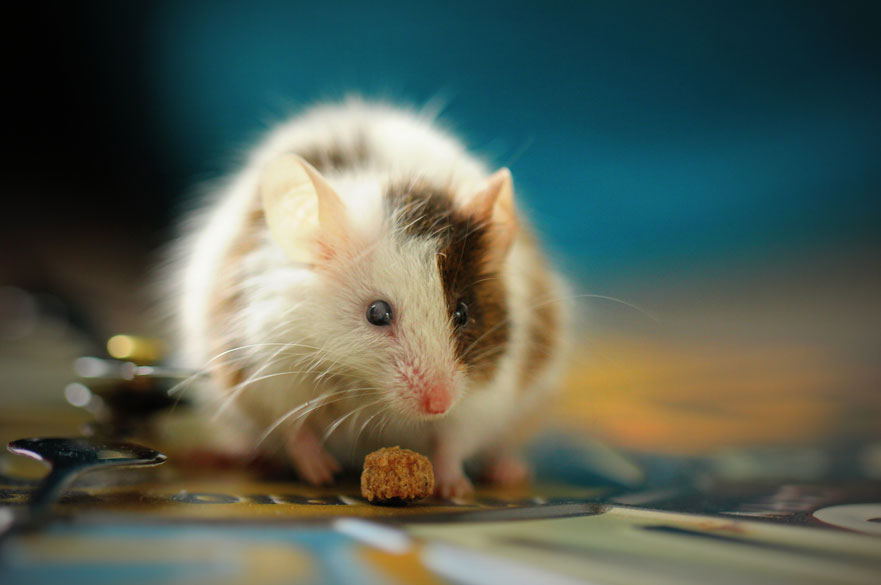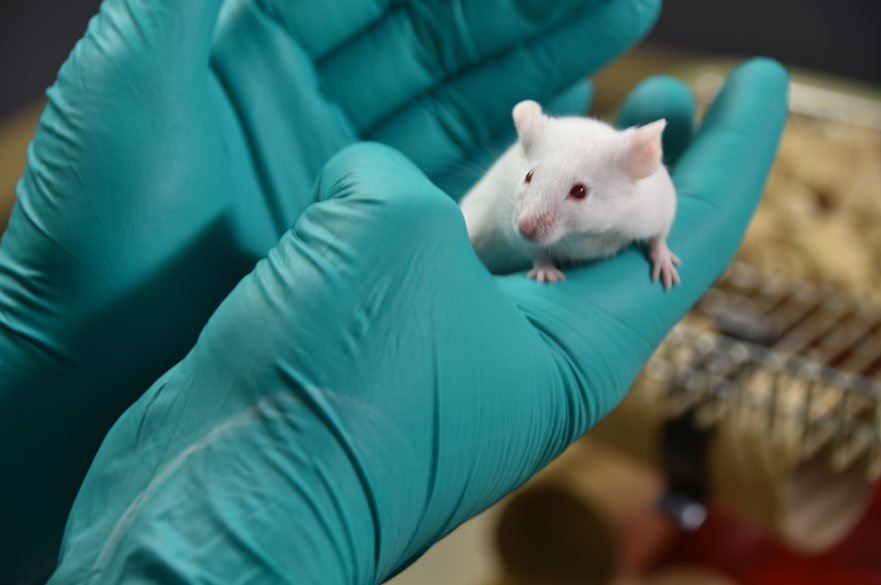Research Involving Animals
At NTU, we are committed to open and ongoing dialogue with the public about why animals are used in our research.

At Nottingham Trent University (NTU), we’re inspiring the brightest minds to rise up and find solutions to some of the most significant global challenges facing society. From the creation of ground-breaking cancer therapies to developments of novel treatments for brain disorders, our research is making a real-world impact - helping to diagnose life-threatening illnesses and save lives.
Where possible, our research relies on mathematical and computer models and established cell lines. However, to advance scientific findings into improvements in human health, the use of animals remains an essential part of biomedical research.
Our Bioscience Support Facility (BSF) at the University's Clifton Campus has a highly skilled and dedicated team of animal professionals that provide both care and experimental oversight for our animals. At NTU, our culture of care ensures all animals are treated with compassion and respect. Not only is a high standard of welfare important for the animals within our labs, but it also helps improve our research findings and the lives of the people that benefit from our research.
The UK has some of the highest standards of laboratory animal welfare in the world, and animal research can only be undertaken in the UK where there is no suitable non-animal alternative. By law, researchers must work to minimise the potential suffering a laboratory animal may experience. This may be done by using analgesia or anaesthesia to alleviate pain during or after a procedure, or by providing enrichment for animals in order to encourage mental stimulation and prevent boredom.
The vast majority of our procedures are classified as sub-threshold, mild or moderate, and it is in the researchers' interests to make sure animals suffer as little as possible - as stressed animals are less likely to produce reliable results.
Research at NTU is carried out under the authority of the Animals (Scientific Procedures) Act, which regulates the use of animals in research and ensures that studies undertaken are absolutely necessary.
Concordat for Openness in Animal Research
We are committed to an open and ongoing dialogue with the public about why animals are used in our research.
Nottingham Trent University, along with other higher education institutions, industrial companies, charities and research councils, has signed the Concordat for Openness in Animal Research. This informs our standard and governance and is our pledge of working towards a more transparent and engaged approach to animal research.
We also promote the use of the Animal Research: Reporting in Vivo Experiments (ARRIVE) guidelines. This is a checklist for researchers designed to improve the quality, reliability and reproducibility of their published research.
How we ensure animal welfare
NTU is comprised of a dedicated team of highly experienced animal research scientists who care for the animals used for regulated procedures, provide expert advice and support and conduct projects on researchers’ behalf. We also have a Named Veterinary Surgeon (NVS), who provides additional specialist advice to researchers undertaking studies on animals.
The University has a Home Office approved animal facility that fully complies with Government Codes of Practice for undertaking research on rodents . The staff responsible for the care and welfare of the animals make every effort to not only comply with the Codes of Practice, but provide husbandry and environmental enrichment practices that exceed the minimum required standards.
The staff engage with in vivo (research undertaken on living organisms) groups throughout the country - along with suppliers - to ensure that any relevant welfare advancements and best practices are identified, implemented, and shared to enhance animal welfare.
Our scientists are encouraged to undertake continued professional development which includes attending research seminars, training workshops and the reading of relevant literature to further their knowledge and skills.
All animal research at the University is overseen by the Animal Welfare and Ethical Review Body (AWERB). Our AWERB committee sits on a regular basis and its members provide continuing advice and support and scrutiny of projects being proposed.
Our members include:
- Named Animal Care and Welfare Officer(s)
- Named Veterinary Surgeon
- Named Training and Competency Officer
- Named Information Officer
- Project Licence holders
- Scientific researchers
- Lay member
- Administrator
In 2022, NTU carried out 3904 scientific procedures using animals, with the vast majority of these involving mice. As part of our commitment to openness around animal research undertaken at the University, see a full breakdown below.
Numbers used per year | 2020 | 2021 | 2022 | 2023 | 2024 |
Mice | 3599 | 3234 | 4126 | 4367 | 3619 |
Rats | 43 | 97 | 118 | 59 | 42 |
Guinea Pig | 12 | 5 | 9 | 4 | 4 |
Total No of Animals | 3654 | 3802 | 4253 | 4430 | 3665 |
Total Procedures | 3391 | 3336 | 3904 | 4376 | 3482 |
Severity of Undertaken Procedures
At the end of the animal's life, or when it is discharged from the control of Animals (Scientific Procedures) Act and no further scientific data are to be collected, the actual procedural impact can be determined and categorised. Actual severity must reflect the highest severity of the procedure, including any accumulation of lesser events.
Actual Severity - | 2020 | 2021 | 2022 | 2023 | 2024 |
Non-recovery | 7 | 7 | 14 | 12 | 16 |
Mild | 1175 | 1924 | 2284 | 2801 | 2195 |
Moderate | 157 | 323 | 591 | 401 | 333 |
Severe | 14 | 35 | 37 | 34 | 23 |
Sub-threshold | 2038 | 1047 | 978 | 1128 | 915 |
| Total | 3391 | 3336 | 3904 | 4376 | 3482 |

Our research impact
Our use of animals to continue to advance medical and scientific knowledge covers several research areas including but not limited to cancer research, cardiovascular research and research into pain and metabolic diseases.
Discover examples of work undertaken by researchers within the Biomedical Support Facility and the impact that has or is expected to have an impact on key medical and scientific advancement.
Although current treatments such as radiotherapy, chemotherapy and hormone treatments can be effective against primary and secondary cancers, they can be associated with significant toxic side-effects, and therapeutic resistance often occurs. The spread of primary disease to other tissues (metastasis), tumour relapse and resistance to therapy remain the principal causes of death for patients with cancer.
An effective immune system is crucial for protecting against the development and progression of the disease. It has also been shown that the successful induction of immunity to cancer-associated antigens can lead to tumour regression or disease stabilisation in several experimental animal models and clinical settings. It is also clear that clinical outcomes for patients with cancer are influenced by the presence of effective, protective anti-tumour immune responses.
Vaccines are a type of immunotherapy. Unlike vaccines to prevent us from disease, cancer treatment vaccines are for people who already have cancer. Cancer vaccines help your body’s immune system recognise and attack cancer cells. This is the area that the John van Geest Cancer Research Centre is focusing on.
Current research areas include the development of novel vaccines to treat breast cancer, prostate cancer and Glioblastoma Multiforme – one of the most aggressive forms of primary brain tumours.
Pain is usually a short lasting but uncomfortable experience that is controlled by the sensory nervous system. When these systems go wrong, chronic (long lasting) pain occurs – leading to sensory complications such as prolonged or exacerbated pain. Our work utilises an array of cellular and in vivo research methods to understand neurophysiological systems in relation to pain, to allow a greater understanding of how the sensory nervous system functions.
Current research areas within this category include research into diabetic neuropathic pain and chemotherapy induced sensory neuropathic pain.
Globally, Zika has been estimated to cause an average yearly loss of 44,000 disability-adjusted life years (DALYs) between 2010 and 2019. Furthermore, Zika virus is emerging in other regions, most notably India. No vaccines are yet available for Zika. NTU is collaborating with colleagues at the University of Nottingham to assess the immune response of novel DNA vaccine formulations so it can be given by a simple injection.
The assessment of vaccine delivery using new novel proprietary technology is also being evaluated with colleagues at the University of Nottingham. The DNA delivery platform is an alternative to mRNA and could be transformative in terms of cost and speed to manufacture and stability. It would allow single dosing and be deployable under ambient storage conditions. The device will allow self-administered, needle-free, home immunisation with a low-cost, this with the DNA use could be transformative in achieving the rapid-response and deployment in the event of a localised viral outbreak or global pandemic.
NTU research in this area aims to provide novel mechanistic insights into the structural and functional alterations of the blood-brain barrier and other peripheral immune organs following brain lesions and ageing. Current research in this area is focusing on the delivery of therapeutic molecules that could accelerate stroke recovery, novel therapies that aim to prevent brain damage caused by intracerebral haemorrhages, and the investigation of preserving the function of the brain in healthy ageing.
In later life, humans experience a profound decline of muscle mass and function – often exacerbated by chronic-ill health. Currently, there is a lack of knowledge surrounding the key factors dictating this decline in functional capacity and as a result currently there is no available treatment to prevent muscle loss in humans.
Our researchers are using mouse models to understand how nutrient and steroid hormone interplay can improve the contraction and metabolic action of skeletal muscle. These works have discovered the previously unknown regulation of nutrient controlled pathways specific to skeletal muscle become activated under periods of metabolic stress induced by the absence of specific genes.
These studies have provided new information that can be related to how human skeletal muscle dysfunction occurs in parallel with the development of chronic pathologies such as type 2 diabetes, cardiovascular disease and neurological disorders.
Improvements in the knowledge of fundamental mechanisms critical to tissue physiology can also be used in translational works aimed at sustaining skeletal muscle function in aged adults or those living with chronic diseases.
Further information
For further information about the use of animals in research at NTU, please contact us at research@ntu.ac.uk.
You can find out more about the use of animals in research across the UK by accessing the resources below.